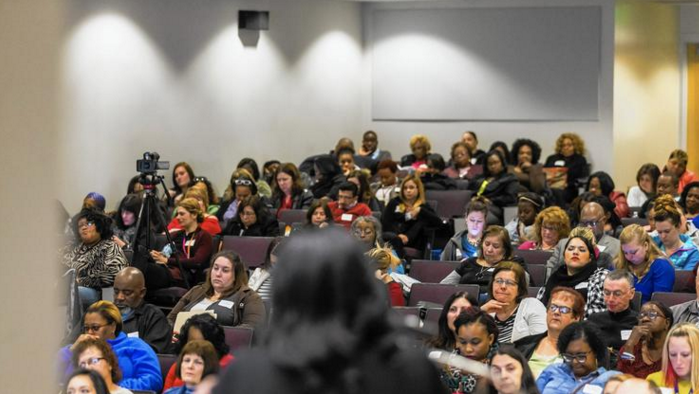 As the stark image of the Flint (Mich.) Water Plant was posted on the screen, pediatrician Renee Boynton-Jarrett told a packed Berglund Auditorium that the city's lead-poisoned water supply was a stark reminder that lead and other early childhood traumas, such as abuse and neglect, can have long-reaching negative health effects.
As the stark image of the Flint (Mich.) Water Plant was posted on the screen, pediatrician Renee Boynton-Jarrett told a packed Berglund Auditorium that the city's lead-poisoned water supply was a stark reminder that lead and other early childhood traumas, such as abuse and neglect, can have long-reaching negative health effects.
"(Unlike with lead) there isn't a blood test to measure toxic level of social adversities," said Boynton-Jarrett, who is a doctor at Boston Medical Center. "If you at look at child abuse and neglect, we don't have a test to tell us what severe effects it has. It can have an enduring and a lasting imprint on the health and development of a child, a family and a community."
Boynton-Jarrett, who is also associate professor of pediatrics at Boston University School of Medicine, was the keynote speaker for Indiana University Northwest's 26th annual forum on child abuse and neglect, which was attended by many local social workers and others who work for and with children. The forum's theme was "Raising Northwest Indiana."
The Flint water crisis has led to more communities discovering high lead levels in their water systems, such as in schools in Newark, N.J., and Boston. Boynton-Jarrett pointed to recent studies that have shown a link between childhood trauma and chronic conditions such as obesity, diabetes and cardiovascular disease.
Research in Boston has shown that high-crime areas reflect that as well, she said.
"In Boston, we looked at the rate of violent crimes, and those (high crime areas) were the same areas which had high clusters of childhood obesity and hypertension, which is very rare," Boynton-Jarrett said. "Children living in those areas are disproportionately experiencing high rates of negative health outcomes."
As part of the Vital Village Network, Boynton-Jarrett and others are helping to improve child well-being in three Boston neighborhoods, through programs such as centering pregnancy classes, encouraging healthy behavior in young men and increasing access to parks and greenspaces. Efforts like that in Boston are possible elsewhere when communities are committed, she said.
"The work can be exhausting and there's a ton of commitment to partner with all of these groups, but I just ask you to look 30 or 40 years into the future," Boynton-Jarrett said. "We know the consequences of early childhood adversity and that there are smart social programs, which make difference in the lives of children. When you look back at this moment in time, what do you want to be able to say your goal was?"
Read the full article